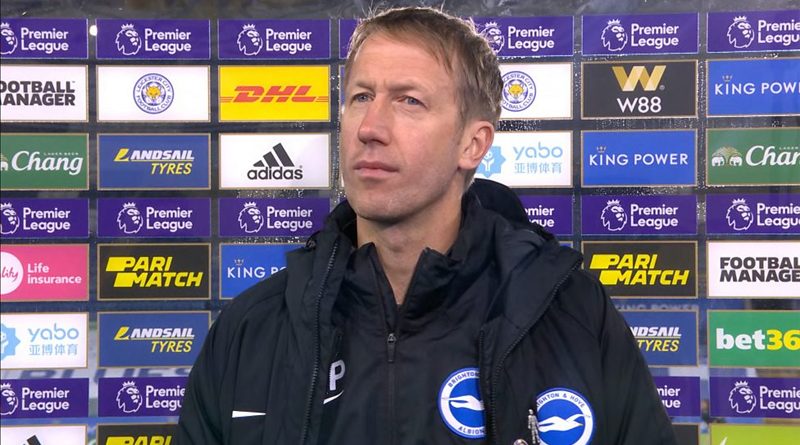After 50 games in charge of Brighton, is the Potter project working?
Graham Potter passed a notable landmark in Brighton & Hove Albion’s trip to Leicester City as the 3-0 defeat at the King Power Stadium saw him reach 50 Premier League games in charge of the Seagulls.
Being comfortably beaten by the Foxes was not how Potter would have wanted to mark the occasion. It also meant that, for the first time in his reign so far, there are now Brighton supporters openly questioning whether he is the man to take the club forward.
Those grumbles are not surprising. Any manager who oversees a run of five wins in 30 league matches should be under pressure. You could even argue that Brighton fans have been overly patient with Potter; how many other fanbases would tolerate one home win in 18 in an entire calendar year?
Empty stadiums have probably helped. If there had been 30,000 paying spectators inside the Amex for every game in 2020, you can only imagine the disappointment and frustration that would have built as Brighton rattled through home matches with Aston Villa, Watford, Crystal Palace, Newcastle United, West Bromwich Albion, Burnley and Southampton without a victory.
Brighton now find themselves just two points off the relegation zone and with a couple of massive games to come in the space of five days away at Fulham and home to Sheffield United, two of only four clubs who sit below the Albion in the table.
It feels like the Potter Project is at a crossroads. Fail to pick up a decent points haul from those next two fixtures and Brighton will probably surrender their proud record of never having been in the relegation zone since winning promotion to the Premier League in 2017.
We will have been unable to beat any of the sides below us in the table and you would have to wonder where exactly the next three points are coming from.
Beat Fulham and the Blades though and we could move into the safety of mid table, talk of relegation will evaporate and the pressure on Potter will lift.
The margins are that small in the top flight of English football that two games can swing you from doom and gloom to checking out how much a flight to Dinamo Tbilisi for next season’s Europa League is going to cost.
Potter passing the 50 games in charge mark combined with entering a period of games which looks so critical to determining the success of his time as Brighton manager makes this a good point to examine whether the Potter project is working for the Albion.
There has been much to like about what he has done in his 50 games at the helm of Brighton. The most obvious place to start is the style of football, which is at times some of the best that the Albion have ever played in their history.
Plaudits have flooded in from pundits, rival managers and supporters of other clubs for Potter’s possession based, attacking football. We are constantly told about Brighton’s expected goal stats and possession percentages being up there with the numbers being recorded by Europe’s top sides.
Which is lovely – except none of it translates to points on the board, which is the currency that really matters in football. Until the Premier League decide to start issuing bonus points for pretty football and xG, then the Potter Project will not be a success unless the Albion start getting results.
Having more of the ball against Manchester United in September 2020 does not prevent you playing Luton Town away from home in the Championship in September 2021.
Sometimes, it does all click for the Albion. On their day, Brighton under Potter can go toe-to-toe with the best teams in the Premier League and match them.
Last season’s 3-0 win over Tottenham Hotspur and home and away double over Arsenal and this season’s matches with Manchester United and Liverpool and proof of that.
The trouble Potter has is that those days are rare. The excellent performance against Jurgen Klopp’s champions was bookended at the Amex by a 0-0 draw with Burnley and a 2-1 defeat to Southampton.
Manchester United committed a form of daylight robbery to leave Sussex with all three points in September as Brighton had battered them for 90 minutes.
How did the Seagulls follow that up? By losing at Everton, drawing at Palace and failing to beat West Brom at home. Potter has been unable to deliver any consistency in results throughout his 50 games in charge of Brighton. There are reason for that, which we will get to.
What else is there to like about the Potter Project? His faith in youth comes at a time when the Albion are investing heavily in their development squad and pathway to the first team.
Chris Hughton was too risk-averse to consider throwing any young players into the world of the Premier League. Under Potter, we have seen Steve Alzate, Aaron Connolly, Ben White, Robert Sanchez and Jayson Molumby make their league debuts.
There is a lot of talent coming through and Potter is not afraid to use it, which is vital if the club are to move from being reliant on Tony Bloom’s deep pockets to producing their own homegrown players.
Brighton have, by and large, been going the right way under Potter too. When he replaced Chris Hughton in the aftermath of the 2018-19 season, it was to deliver Bloom’s publicly stated ambition of turning Brighton into a top 10 Premier League club.
The long-term project involved season-upon-season improvement. Potter delivered that improvement in 2019-20, securing a 15th placed finish compared to the 17th spot of the previous campaign and with a record Premier League points total of 41.
So far in 2020-21, it feels like Brighton have gone backwards because of their precarious position just above the relegation zone. In reality though, the Albion have matched the results they got from their corresponding fixtures against Chelsea (H), Manchester United (H), Everton (A), Palace (A), Spurs (A), Burnley (H) and Southampton (H) last season.
They have bettered 2019-20’s results from Newcastle United (A), Aston Villa (A) and Liverpool (H). The only fixture which has delivered a worse outcome so far in 2020-21 for Brighton is Leicester away, where last season’s 0-0 draw was replaced by that 3-0 defeat which brought Potter up to the 50 games mark. Based on this results comparison, maybe this season is not panning out quite as badly as we all think.
Still, there are some glaring weaknesses in Potter’s management which his first 50 games in charge of the Albion have highlighted.
The first is a lack of consistency in selection. The most successful teams are those that have a settled side with clearly defined roles. Potter chops and changes his line up more regularly than Katie Price does husbands.
We may joke about the concept of the Potter Roulette Wheel being used to decide who is playing where every week, but players constantly being shifted from one position to another is no laughing matter.
How can they be expected to get into a good run when one week they are playing as a left wing back and their next start comes as the right sided defender in the back three, as has happened to Dan Burn?
Or what about Joel Veltman, who has played as a right wing back, right back and centre back so far? Pascal Gross had two goals and two assists playing as a number 10, so where is the logic in rewarding him for that form by moving him to a holding midfield role?
You sometimes get the feeling that Potter is trying to be too clever. It is like he is trying to live up to this reputation as a tactical whizz kid by making completely unnecessary chances which, to the rest of the world, are nonsensical. Take your pick from Gross, Dale Stephens and Davy Propper all serving stints at right back for a potential winner in that category.
Then there are the constant adjustments in the middle of games. The worst example of that came when Brighton were leading Aston Villa 1-0 at the Amex last January and Steve Alzate at right back had pocketed Jack Grealish for an hour.
Potter’s response? Take off centre forward Aaron Connolly, move Aaron Mooy into a number 10 role behind Neal Maupay, Alzate into midfield and bring on Martin Montoya. Within six minutes of Potter’s game of positional musical chairs, Grealish found the time and space he needed to equalise for Villa.
Compare that to Brendan Rodgers at the King Power. Rodgers clocked after 15 minutes that Joel Veltman and Dan Burn were two centre backs playing out of position, changed to a 4-2-3-1 to get quick wingers running at them and the result was three goals in 17 minutes which won the game for Leicester.
Rodgers’ changes were calculated, simplistic and executed to wreak maximum havoc on Brighton by ruthlessly exposing a glaring weakness in the Albion’s line up.
Potter meanwhile watched on with the look on his face of a bloke who has lost his TV remote, not reacting to the pummelling his side were taking until the break, by which time it was far too late.
Brighton’s persistence with zonal marking from set pieces despite the fact it clearly does not work is well documented. If you want to defend that way, the least you can do is work on it in training.
Potter seems more concerned with working out who he can stick at right back next than drilling his players in stuff like marking opponents and not allowing free headers.
And finally, there is the striker issue. Whilst Potter cannot physically run on the pitch and bury the chances which Neal Maupay, Danny Welbeck, Leandro Trossard and Connolly have missed so far this season, the manner in which he shrugged off the lack of new striker signing in the summer means he should bear some responsibility for the fact that Brighton do not score anywhere near enough of their opportunities.
When Potter talked of “silver bullet” strikers, it almost felt like he was mocking supporters for thinking that the Albion needed a new centre forward.
Potter said that he would instead increase the output of his existing options, backing his coaching ability to improve their clinicalness. How is that working out?
Ultimately, the success of a manager normally comes down to how many games they win. Potter at Brighton is a little different in that he was also charged with overseeing a huge change in playing style and culture from top to bottom, working closely alongside Dan Ashworth.
Nobody should underestimate how hard a job teeming such a overhaul with delivering points is. But football is ultimately a results business and Potter’s have been questionable.
Potter has a win percentage of 22% from his 50 games in charge of Brighton. Compare that to some of the most notorious managerial reigns in Albion history.
Sami Hyypia had a win percentage of 23% when Bloom finally accepted his resignation with Brighton four points adrift of safety in the Championship relegation zone.
Bloom fired Russell Slade with 29.03%. Micky Adams Version II recorded 24%. Steve Gritt was in charge of what is largely considered to be the worst Brighton team ever in the 1997-98 season and Potter is only equal to his 22%.
Only Martin Hinshelwood, Jeff Wood and Jimmy Case have a worse win percentage than Potter. Hinshelwood and Wood lasted 12 and 13 games respectively whilst Case’s reign was played out to the backdrop of a club who was being asset stripped into extinction.
Having awarded Potter a new six-year contract last November, there seems little prospect that Bloom would pull the plug on his manager any time soon.
He is a patient chairman who gives his bosses every chance to turn things around, as we saw when Hyypia’s initial attempts to quit were turned down despite the fact it was obvious that the Finn was miles out of his depth.
Bloom may not be putting any pressure on his manager, but supporters are starting to grow restless. What happens in the next four matches against Fulham, Sheffield United, West Ham United and Arsenal will have a huge bearing on Potter’s chances of overseeing another 50 games at the helm of Brighton.
For the sake of avoiding a trip to bloody Luton next season, let us hope he starts getting more right than wrong soon. The jury is still out on whether the Potter project is working, but it will not be for much longer.




